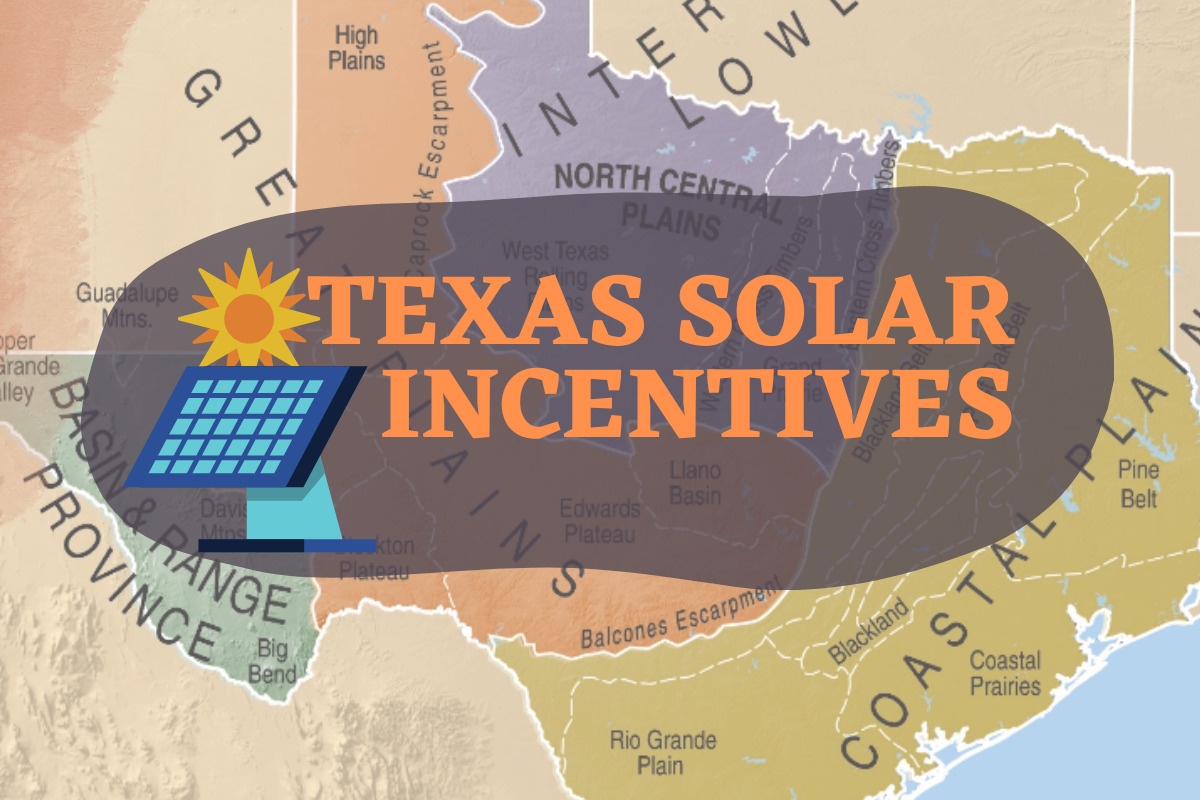Introduction
Texas, a state known for its vast energy resources, has now become a hub for solar power. This shift towards clean, renewable energy is due to the attractive Texas Solar Incentives offered by federal and local authorities.
These incentives include tax credits, rebates, net metering programs, property tax exemptions and more! Property owners eager to save on energy bills while making an eco-friendly choice should not miss this essential guide on Texas Solar Incentives.
Understanding Texas Solar Incentives
Texas offers a range of solar incentives, including federal tax credits, local utility rebates, net metering programs, and property and sales tax exemptions for residential and commercial properties.
Federal Solar Tax Credit
The Federal Solar Tax Credit (ITC) is a financial incentive for Texas property owners to install solar panels. Homeowners can claim up to 30% of their solar energy system cost on federal income taxes.
ITC reduces the overall cost of going solar and speeds up the return on investment. Texas residents should act promptly as the ITC will phase out over time. The credit will decrease to 26% in 2033 and settle at 22% from 2034. Don’t miss out on the benefits of the ITC and start planning your solar panel installation today.
Local Utility Company Solar Rebates
In addition to federal incentives, many local utility companies in Texas offer solar rebates to their customers. Rebates can offset the cost of installing a solar panel system. This makes it more affordable for property owners transitioning to renewable energy.
For example, CPS Energy’s Solar Host program offers a rebate of up to $2,500 for residential customers who install qualifying solar panel systems. Similarly, Austin Energy’s Value of Solar Tariff program offers credit payments for excess energy produced by solar panels on both residential and commercial properties.
It’s important for property owners to research what incentives are available from their utility company as they vary across different regions in Texas.
Net Metering Programs
Net metering programs are a key incentive for Texas residents who want to install solar panels. These programs allow homeowners and businesses to generate their own electricity through solar power, while also being connected to the electrical grid.
For example, if a homeowner generates more energy than they use during the day when their solar panels are producing at peak capacity, that extra energy can be sent back into the grid and credited against future bills.
This helps reduce overall electricity costs and can even result in zero net electricity usage over time.
Property Tax Exemptions
One of the major benefits of going solar in Texas is property tax exemptions. Solar energy systems installed on your property can exempt you from additional taxes. The Texas Property Tax Code allows for this exemption.
For example, if you were to install a solar panel system worth $20,000 on your property, without any exemptions or rebates, this would increase your home’s value and lead to an extra $500 per year in property taxes.
However, with a property tax exemption for your solar installation under Texas law, you could avoid these added costs entirely.
Sales Tax Exemptions
Property owners who are considering going solar in Texas should know that they may be eligible for sales tax exemptions on their solar energy system. The state of Texas offers a sales tax exemption for residential and commercial solar installations, which could save property owners thousands of dollars on their initial investment.
This means that the cost of purchasing and installing a solar panel system could be significantly reduced with this tax break.
Moreover, some counties in Texas offer specific grants and incentives for those who choose to go green through the installation of renewable energy systems such as photovoltaic (PV) panels.
For example, Harris County homeowners can receive up to $2,500 in rebates through the Solarize Houston program funded by the Houston Climate Action Plan.
Eligibility And Requirements For Texas Solar Incentives
To be eligible for Texas solar incentives, residential and commercial properties must comply with state and local regulations on type and size of installation, while keeping accurate records.
Residential And Commercial Properties
Whether you are a homeowner or business owner, there are incentives available for installing solar panels in Texas. Both residential and commercial properties can take advantage of the federal solar tax credit, which allows up to 30% of the cost of the system to be credited back on taxes.
It’s important to note that eligibility for these incentives may depend on factors such as compliance with state and local regulations, type and size of installation, and property ownership.
Type And Size Of Installation
When it comes to solar panel installation, the type and size of your property will play a significant role in determining what incentives you are eligible for. Typically, homes with larger roofs or open land have more space for installing solar panels, but smaller properties can still benefit from renewable energy options.
To maximize available Texas solar incentives, it’s important to work with a reputable contractor who can help you navigate any regulations that may impact your specific installation.
Accurate record-keeping is another key factor in ensuring that you receive all available rebates and tax credits.
Compliance With State And Local Regulations
To be eligible for Texas solar incentives, it is important to comply with state and local regulations. This includes meeting building codes and obtaining the necessary permits before installing a solar energy system.
It’s also essential to work with a reputable solar contractor who can help ensure compliance with these regulations.
For instance, some counties like Harris County offer specific solar incentives and grants. However, they require applicants to meet certain requirements before gaining approval of their projects.
Compliance is vital when seeking such incentives because failure could mean being ineligible for them altogether.
By being mindful of state and local regulations from the start of your project and working with experienced professionals who know how to navigate them appropriately, you can maximize your chances of receiving available Texas solar incentives while remaining within legal boundaries.
Maximizing Texas Solar Incentives
To get the most out of Texas solar incentives, homeowners and property owners should conduct thorough research on the available programs, work with a reputable solar contractor, evaluate their energy needs and usage, comply with local regulations, and keep detailed records.
Research And Understand Available Incentives
If you’re a property owner in Texas looking to go solar, the first step is to research and understand all available incentives. Some of the incentives include tax credits, rebates, net metering programs, property tax exemptions, and sales tax exemptions.
Federal solar tax credit can provide up to 30% of cost against income taxes. Local utility companies offer solar rebates as well as net metering programs that allow residents to sell excess energy back to the grid.
It’s also important to work with reputable solar contractors who can help evaluate your energy needs and maximize your savings.
Work With A Reputable Solar Contractor
Working with a reputable solar contractor is essential when planning to install a solar panel system in your property. A qualified and experienced contractor will guide you through the process, ensuring that everything from installation to maintenance is done properly.
It’s important to do your research and choose a licensed and insured contractor who has experience installing systems like yours.
Additionally, working with trusted contractors can help maximize available Texas solar incentives such as federal tax credits or local utility company rebates. These professionals have knowledge about various financing options to assist homeowners in finding the best way to power their homes using renewable energy while saving money at the same time.
Evaluate Energy Needs And Usage
To maximize the benefits of Texas solar incentives, it’s crucial to evaluate your energy needs and usage. This involves assessing how much electricity you use on a daily basis, as well as when and where you use it.
For example, if you have a larger property with high energy consumption during peak hours in the summer months, a larger solar panel system may be necessary to offset those costs.
On the other hand, if you have a smaller home or consume less energy overall, a smaller solar panel system might suffice.
Ensure Compliance With Local Regulations
It’s vital to ensure compliance with state and local regulations when installing a solar energy system in Texas. Failure to do so could lead to violation fees or even removal of the system.
To avoid this, it’s important to research and understand the relevant regulations before beginning any installation work.
Working with a reputable solar contractor is also crucial as they will understand the legal requirements for your location and can help you navigate any compliance issues.
Additionally, keeping accurate records of your installation process will not only help ensure compliance but also make it easier to claim any available tax credits or rebates.
Did you know that there are federal solar tax credits available for Texas residents who install solar panel systems? And that qualified homeowners with home solar in Texas could be eligible for a tax credit of up to 30% against the cost of the system? It’s time Texans join the burst towards going green!
Store Accurate Records
Keeping accurate records is crucial when it comes to maximizing Texas solar incentives. Keep all receipts and documentation for solar panel installation. Also, keep records of energy production and consumption data. These documents will be useful for tax purposes and warranties.
Additionally, keeping accurate records will help you track your energy savings over time, making it easier to evaluate the effectiveness of your solar panel system and determine if any adjustments need to be made. Remember that proper record-keeping can also come in handy during property resale transactions.
Overall, by being diligent in keeping accurate records related to their solar panel systems’ installation and usage details like expenses incurred on this infrastructure for reducing carbon footprint can benefit Texan residents with better access to available benefits they’re eligible for under state-specific incentive programs.

Benefits Of Going Solar In Texas
Going solar in Texas not only helps to reduce energy costs but also increases property values and has a positive impact on the environment, while increasing accessibility to solar energy through programs like TXU Energy Home Solar Buyback Plan.
Reduced Energy Costs
One of the biggest benefits of going solar in Texas is reducing your energy costs. By installing a solar energy system, you can lower or even eliminate your monthly electricity bills.
This means that over time, the financial investment in a solar panel system will pay off.
For example, qualified Texas homeowners who install a home solar system could be eligible for a tax credit of up to 30% against the cost of the installation. Additionally, local utility companies offer net metering programs that allow residents to sell excess energy back to the grid and earn credits on their electricity bill.
Increased Property Values
Going solar in Texas saves energy costs and benefits the environment. Solar panel installations can increase property value significantly. Studies by the National Renewable Energy Laboratory show homes with solar panels sold for up to 20% more. Consider the financial and environmental benefits of solar energy for your Texas property.
In addition, going solar in Texas can provide long-term savings that translate into substantial financial benefits over time. With net metering programs available in the state, homeowners who produce excess energy from their solar panels can sell it back to the grid and potentially earn additional income.
Positive Environmental Impact
Going solar in Texas has a positive environmental impact that benefits everyone. By reducing carbon emissions, we are creating a cleaner and healthier environment for future generations.
Additionally, choosing renewable energy sources like solar power can help reduce our dependence on fossil fuels and decrease our overall carbon footprint. With Texas being one of the largest energy-producing states in America, utilizing solar power can have an enormous impact on reducing greenhouse gas emissions statewide.
Increased Accessibility To Solar Energy
Going solar in Texas can provide increased accessibility to clean, renewable energy which is not only eco-friendly but also reduces your dependence on fossil fuels. With net metering programs, you can sell excess energy back to the grid and reduce electricity costs.
Installing solar panels in your property helps reduce carbon emissions and promotes sustainability. Solar energy contributes to lowering your environmental impact and increasing property value. You can enjoy financial benefits like tax credits and rebates from local utilities and federal incentives. Going green with solar energy benefits both the environment and your finances.
The TXU Energy Home Solar Buyback Plan
The TXU Energy Home Solar Buyback Plan is a great incentive for Texas residents who have solar panel systems installed. Homeowners can earn credits for excess solar energy they generate. The credits can be sold back to the grid at competitive rates. This plan helps homeowners save money and earn extra income. It also incentivizes renewable energy investments and reduces carbon emissions.
By participating, homeowners contribute to a cleaner and greener environment. Take advantage of this program to benefit financially and environmentally.
Conclusion
In conclusion, Texas is an ideal state for homeowners and businesses to take advantage of solar incentives. By understanding the available incentives and eligibility requirements, property owners can maximize savings on installation costs and energy bills. Federal tax credits, local rebates, net metering, and tax exemptions make investing in renewable energy favorable. Solar benefits properties and the environment by cutting costs and reducing carbon footprint.

FAQs:
- What are the solar incentives available in Texas?
Texas offers several solar incentives to encourage homeowners and businesses to use renewable energy sources. This includes as rebates, net metering, tax credits and other programs that promote energy efficiency.
- How do I qualify for these solar incentives in Texas?
Qualification criteria for each program depend on factors such as system size, equipment standards, and local regulations. It is important to consult a professional when deciding which methods or programs suit individual needs best.
- Can I claim federal tax credits if I install a solar panel system in my home or business?
Yes! Investing in solar panels can yield up to 30% in federal income tax credits (based on installation date).
- How long will it take me to save money by installing a solar panel system?
Savings vary based on weather, usage, and other factors. But typically recoup costs within 5-7 years while reducing emissions over time.


